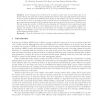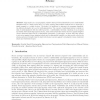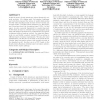242 search results - page 34 / 49 » Randomness in Cryptography |
PKC
2009
Springer
16 years 11 days ago
2009
Springer
A key exchange protocol allows a set of parties to agree upon a secret session key over a public network. Two-party key exchange (2PKE) protocols have been rigorously analyzed unde...
P2P
2009
IEEE
15 years 6 months ago
2009
IEEE
Peer-to-peer content dissemination applications suffer immensely from freeriders, i.e., nodes that do not provide their fair share. The Tit-for-Tat (TfT) incentives have received ...
FSTTCS
2009
Springer
15 years 6 months ago
2009
Springer
ABSTRACT. A non-local box is an abstract device into which Alice and Bob input bits x and y respectively and receive outputs a and b respectively, where a, b are uniformly distribu...
116
click to vote
PROVSEC
2009
Springer
15 years 6 months ago
2009
Springer
Signcryption is a cryptographic primitive that provides authentication and confidentiality simultaneously in a single logical step. It is often required that multiple senders have...
CCS
2009
ACM
16 years 13 days ago
2009
ACM
Denial of Service (DoS) attacks are serious threats for network societies. For dealing with DoS attacks, Jakobsson and Juels first proposed the notion of useful client puzzles (UC...



